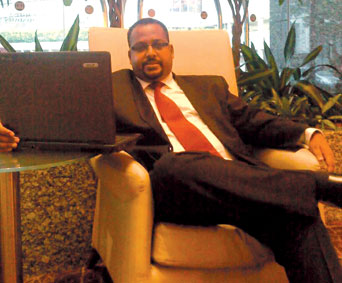Knowledge economy is supreme
 Electronic
commerce or in short e-commerce, refers to business activities like
selling and purchasing of products and services carried out over
electronic systems like the Internet and computer networks. Electronic
commerce or in short e-commerce, refers to business activities like
selling and purchasing of products and services carried out over
electronic systems like the Internet and computer networks.
The history of e-commerce dates back to 1970, when for the first
time, electronic data interchange (EDI) and electronic fund transfer
were introduced.

eMarketingEye Business Solutions Head Niranka Perera |
Since then, a rapid growth of e-commerce has pervaded almost every
other aspects of business such as supply chain management, transaction
processing, Internet marketing and inventory management. This thought
paved way for my next feature.
A creation and sustainability of a knowledge economy is paramount for
Sri Lanka. Knowledge is a tool, which can be utilized to create jobs and
bring about economic reform. Considering the IT sector, it isn’t
feasible for the government alone to develop the education sector to
cater to the rising demand of IT personnel.
The contribution of the private institutions should be encouraged
with the necessary government regulatory frameworks in place to ensure
the quality of education. 70 percent of workers in developed countries
are knowledge-workers, if Sri Lanka strives for same, an economic boom
is sure to follow are the thoughts of a young accomplished business
mind, eMarketingEye (Pvt) Ltd Business Solutions Head Niranka Perera.
An old boy of S. Thomas’ College Mt. Lavinia, Niranka is the youngest
in the family with two older brothers, both working in the IT sector,
his dad is an entrepreneur and his mother is a gemologist.

Niranka in his childhood |
A qualified Project Manager with a degree and an MBA he has worked in
the ICT industry for the past seven years.
When queried about his childhood dream similar to many of my
interviewees he commented about his vagueness in his future. According
to Niranka, He hadn’t really focused on a career path during his school
days.
He wanted to be many things, a marine biologist, an engineer and just
about anything in between based on the time of day, he recalls. As he
matured he realized he had the knack for marketing and he as a youngster
was computer savvy, understanding the basics with relative ease.
Gradually during the last couple of years at school, when a career
choice seemed more tangible, Niranka chose the field of IT, with plans
to complete a degree in ICT.
When we say IT, most people think of it as one composite sector. But
in reality, IT offers various disciplines that are based on the same
foundation.
He believes there is something for everyone, be it UI Engineering,
Software Engineering, Database Engineering or any of the other multitude
of interrelated disciplines within the sector.
He chose UI Engineering as he wanted to design the look and feel of
software and define how people interacted with IT systems. He was also
confident in his choice as he knew once within the IT sector, if one had
the necessary foundation; it was relatively easy to switch between the
various disciplines, at least at the initial stages of one’s career.
“The fact that I later specialized in Software Project Management is a
testament to that”, he says. He described the impact of IT in him as a
person, “IT has had an immense impact on me.
Having studied part-time and worked full-time, at the age of 22, I
was the Delivery Manager for a US based Software Development company
while most of my friends were still finishing their degrees.
I firmly believe such an opportunity for career development and rapid
progression is only available in the IT sector.
At eMarketingEye, I have had the opportunity to attend training
sessions at Google Singapore, address international conferences and also
help conduct Sri Lanka’s first online marketing forum”.
Opportunities such as these are not unique in the IT sector. Having
worked with engineers and other IT professionals from various
universities and all-walks of life, it is gratifying to see how
individual brilliance is easily visible and how it is rewarded within
the sector. “I believe if I had chosen any other sector, my career
progress would have been very different”.
Coping with an evolving industry is a challenge, few extracts from
his thought are, Continuous learning is at the core of the IT industry
and this is why IT becomes a specialist industry.
For example, software engineers may choose between Microsoft
technologies, Java based technologies or Open Source technologies and
then specialize in one area. It helps narrow the scope and makes
continuous learning feasible.
The fact that Software Engineering principles remain the same, makes
it easier for someone to switch from one technology stack to another if
so desired.
For a company, initially a similar specialization may be prudent at
the start. Once the company is stable, structured diversification into
other IT disciplines would be feasible. Transparency and performance
based metrics are a must. In the end, how a company manages the
‘iron-triangle’ of time, scope and cost is how it would sustain an
advantage over its competitors.
Contribution of the youth was my next query, according to Niranka the
knowledge the world has to share with is mostly in English and as such
Niranka believes a genuine effort is required by Sri Lanka youth to
learn English. “To develop themselves through further reading and
self-study not only benefits them as individuals but their companies and
the whole knowledge based sector. Having worked with engineers from
various countries, I believe our talent is second to none but our
language skills in general require further development”.
Speaking about the key challenges Niranka shared that English
language skills and employee turnover are the biggest challenges faced
by a BPO.
As most BPOs serve US and European clients, it is immensely difficult
to source the right candidates due to the language barrier.
In such a situation a considerable investment is needed to develop
these skills. If this initial investment is to be redeemed, then issues
of employee turnover should be addressed next.
BPOs that offer entry level opportunities with the promise of higher
education and career opportunities within the company or related
businesses later.
This would seem to be an ideal scenario that benefits the company and
the individual. Virtusa as a leading IT services company does this
really well.
Sri Lanka has an immense advantage in the IT/BPO sector. Sri Lanka is
emerging as a global IT-BPO destination of choice in number of key focus
domain areas.
Sri Lanka is ranked among the Top 50 Global Outsourcing destinations
by AT Kearney and ranked among Top 20 Emerging Cities by Global Services
Magazine.
Niranka shared his thoughts “The development of the IT sector would
help Sri Lanka earn foreign exchange while creating jobs. Benefits such
as increases in Per-Capita-Income and Knowledge in-flux are sure to
follow”. |



